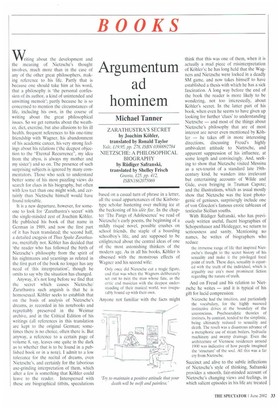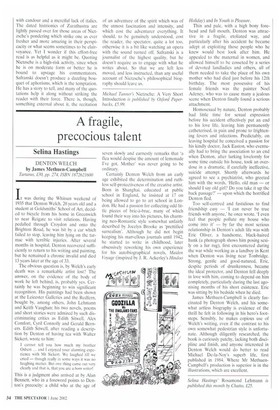Argumentum ad hominem
Michael Tanner
ZARATHUSTRA'S SECRET by Joachim Kohler, translated by Ronald Taylor Yale, £19.95, pp. 278, ISBN 0300092784 NIETZSCHE: A PHILOSOPHICAL BIOGRAPHY by Riidiger Safranski, translated by Shelley Frisch Granta, £25, pp. 412, ISBN1862075069 Writing about the development and the meaning of Nietzsche's thought involves, much more than in the case of any of the other great philosophers. making reference to his life. Partly that is because one should take him at his word, that a philosophy is 'the personal confession of its author, a kind of unintended and unwitting memoir'; partly because he is so concerned to mention the circumstances of life, including his own, in the course of writing about the great philosophical issues. So we get remarks about the weather, diet, exercise, but also allusions to his ill health, frequent references to his one-time friendship with Wagner, his abandonment of his academic career, his very strong feelings about his relations (the deepest objection to the "Eternal Recurrence", my idea from the abyss, is always my mother and my sister') and so on. The presence of such surprising subjects is ignored by many cornmentators. Those who seek to understand better some of his most puzzling views do search for clues in his biography, but often with less tact than one might wish, and certainly than Nietzsche himself would have found tolerable.
It is a new departure, however, for someone to look for 'Zarathustra's secret' with the single-minded zest of Joachim Kohler. He published his book of that name in German in 1989, and now the first part of it has been translated; the second half, a detailed exegesis of Thus Spake Zarathustra, mercifully not. Kohler has decided that 'the reader who has followed the birth of Nietzsche's philosophy from the spirit of his nightmares and yearnings as related in the first part of the book no longer has any need of this interpretation', though he omits to say why the situation has changed.
Anyway, it's not long before we find that the secret which causes Nietzsche/ Zarathustra such anguish is that he is homosexual. Kohler seeks to establish that on the basis of analysis of Nietzsche's dreams, as recorded in his notebooks and regrettably preserved in the Weimar archive, and in the Critical Edition of his writings (all references in this translation are kept to the original German; sometimes there is no choice, often there is. But anyway, a reference to a certain page of volume 8, say, leaves one quite in the dark as to whether that is to be found in a published book or in a note). I admit to a low tolerance for the recital of dreams, even Nietzsche's, and certainly for the laborious axe-grinding interpretation of them, which after a few is something that KOhler could leave to the reader. Interspersed with these are biographical titbits, speculations
based on a casual turn of phrase in a letter, all the usual appurtenances of the Kinbotetype scholar hastening over melting ice at the beckoning of his idee five. In the chapter 'The Pangs of Adolescence' we read of Nietzsche's early poems, the beginning of a mildly risque novel, possible crushes on school friends, the staple of a boarding schoolboy's life, and are supposed to be enlightened about the central ideas of one of the most astonishing thinkers of the modern age. As in all his books, KOhler is obsessed with the monstrous effects of Wagner and his second wife:
Only once did Nietzsche cut a tragic figure, and that was when the Wagners deliberately set out to ruin the man whose fate. as the critic and musician with the deepest understanding of their musical world, was inseparably bound up with their own.
Anyone not familiar with the facts might think that this was one of them, when it is actually a mad piece of misinterpretation of Kohler's; he has long held that the Wagners and Nietzsche were locked in a deadly SM game, and now takes himself to have established a thesis with which he has a sick fascination. A long way before the end of the book the reader is more likely to be wondering, not too interestedly, about Kohler's secret. In the latter part of his book, when even he seems to have given up looking for further 'clues' to understanding Nietzsche — and most of the things about Nietzsche's philosophy that are of most interest are never even mentioned by Kohler — he takes off in more interesting directions, discussing Freud's highly ambivalent attitude to Nietzsche, and apparent suppression of his influence, at some length and convincingly. And, seeking to show that Nietzsche visited Messina as a sex-tourist of a standard late 19thcentury kind, he wanders into irrelevant but entertaining accounts of Wilde and Gide, even bringing in Truman Capote; and the illustrations, which as usual mostly show that Nietzsche was the least photogenic of geniuses, surprisingly include one of von Gloeden's famous erotic tableaux of testicular Sicilian youths.
With Riidiger Safranski, who has previously written useful, fluent biographies of Schopenhauer and Heidegger, we return to seriousness and sanity. Mentioning no names. he writes of biographers who reduce
the immense range of life that inspired Nietzsche's thought to the secret history of his sexuality and make it the privileged focal point of truth. These days, sexuality is equated with the truth of the individual, which is arguably our era's most prominent fiction regarding the nature of truth.
And on Freud and his relation to Nietzsche he writes — and it is typical of his gift for lucid compression:
Nietzsche had the intuition, and particularly the vocabulary, for the highly nuanced instinctive drives at the boundary of the unconscious. Psychoanalytic theories of instincts, by contrast, tended to the simplistic, being ultimately reduced to sexuality and death. The result was a disastrous advance of a metaphoric use of steam boilers, hydraulic machinery and swamp drainage. Even the architecture of Viennese residences around 1900 was indicative of how people imagined the 'structure' of the soul. All this was a far cry from Nietzsche.
Succinct and alive to the subtle inflections of Nietzsche's style of thinking, Safranski provides a smooth, fair-minded account of Nietzsche's changing views and feelings, in which salient episodes in his life are treated with candour and a merciful lack of italics. The dated histrionics of Zarathustra are lightly passed over for those areas of Nietzsche's pondering which strike one as ever fresher and more amazing in their perspicacity or what seems sometimes to be clairvoyance. Yet I wonder if this effort-free read is as helpful as it might be. Quoting Nietzsche is a high-risk activity, since when he is on moderate form or better he is bound to upstage his commentators. Safranski doesn't produce a dazzling bouquet of aphorisms, which is the temptation. He has a story to tell, and many of the quotations help it along without striking the reader with their force. There is, though, something external about it, the recitation of an adventure of the spirit which was of the utmost fascination and intensity, and which cost the adventurer everything. It should, to be genuinely understood, cost the reader, the spectator, quite a lot too, otherwise it is a hit like watching an opera with the sound turned off. Safranski is a journalist of the highest quality, but he doesn't require us to engage with what he writes about. So that we are left less moved, and less instructed, than any useful account of Nietzsche's philosophical biography should leave us.
Michael Tanner's Nietzsche: A Very Short Introduction is published by Oxford Paperbacks, £5.99.







































































 Previous page
Previous page